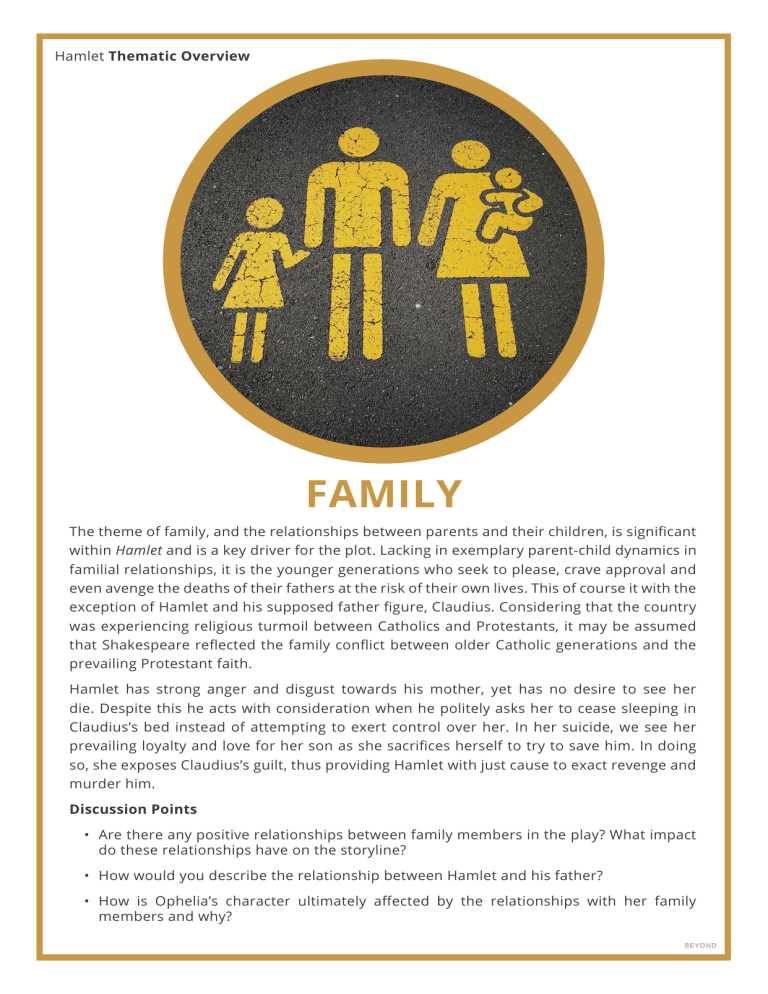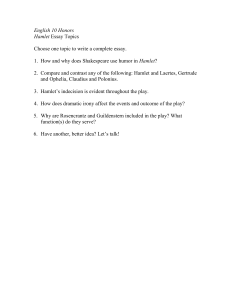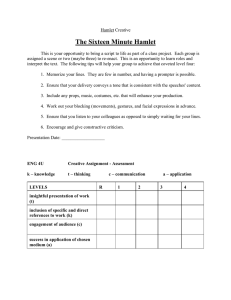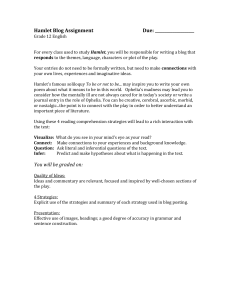
Hamlet Thematic Overview FAMILY The theme of family, and the relationships between parents and their children, is significant within Hamlet and is a key driver for the plot. Lacking in exemplary parent-child dynamics in familial relationships, it is the younger generations who seek to please, crave approval and even avenge the deaths of their fathers at the risk of their own lives. This of course it with the exception of Hamlet and his supposed father figure, Claudius. Considering that the country was experiencing religious turmoil between Catholics and Protestants, it may be assumed that Shakespeare reflected the family conflict between older Catholic generations and the prevailing Protestant faith. Hamlet has strong anger and disgust towards his mother, yet has no desire to see her die. Despite this he acts with consideration when he politely asks her to cease sleeping in Claudius’s bed instead of attempting to exert control over her. In her suicide, we see her prevailing loyalty and love for her son as she sacrifices herself to try to save him. In doing so, she exposes Claudius’s guilt, thus providing Hamlet with just cause to exact revenge and murder him. Discussion Points • Are there any positive relationships between family members in the play? What impact do these relationships have on the storyline? • How would you describe the relationship between Hamlet and his father? • How is Ophelia’s character ultimately affected by the relationships with her family members and why? Hamlet Thematic Overview GENDER While a Shakespearean audience would not bat an eyelid at the repression, control and inferiority of women within Hamlet, it would certainly be seen as problematic by a modern audience. However, it is clear that female characters like Ophelia and Gertrude have been considerably underestimated for their true influence on their male counterparts. Hamlet truly believes that female sexuality and their ‘sexual appetite’ causes them to lead their male counterparts astray while also betraying their own morals. Raging about his mother’s betrayal of his father in her ‘incestuous’ marriage with Claudius, he continues to manifest his misplaced anger towards Ophelia, treating her with utmost cruelty. His cruelty, coupled with the oppression from her father, leaves her in a position where the only decision she feels that she can make for herself is whether to live or die, so she takes her own life. Similarly, in an act that a Shakespearean audience would also perceive as weak and frail, Gertrude’s decision to take her own life may be interpreted as ambiguous and a cry for help to prove her love and loyalty to her son who treated her with disgust and disdain. Discussion Points • What could Shakespeare’s approach in juxtaposing Hamlet’s attitude and the feelings he creates around Ophelia’s and Gertrude’s deaths tell us about his own opinions of women in society? • Do you think the other men in the play share the same attitudes and ideals around women as Hamlet? Why? • What does Ophelia’s death teach us about women’s limited social role in Shakespearean society? Hamlet Thematic Overview REVENGE Hamlet, Laertes and Fortinbras all seek to avenge the deaths of their fathers, yet each action their revenge in different ways. Revenge is the cause of blind anger and poor decision-making, particularly for Hamlet and Laertes, yet it also highlights Hamlet’s struggle, helplessness and procrastination in its subsequent delay lasting the duration of the play. After discovering the true horror of his father’s murder, Hamlet would have been expected to act swiftly. However, what we witness instead is Hamlet’s torment, as he sets out to ‘prove’ Claudius’s guilt. Despite his indecisiveness, Hamlet leaves for England and returns with more clarity and strength to exact revenge. Yet it could still be considered ineffectual revenge, as Hamlet himself dies shortly after. Similarly, we witness the calculated and headstrong Fortinbras as he returns to conquer Denmark. Much like the violent end of Laertes’ life, as he unwaveringly fights to the death to avenge Polonius’s murder. Discussion Points • What message do you think Shakespeare is trying to convey with his approach to revenge and its consequences? • How is Shakespeare trying to portray Hamlet’s inherent nature in his delaying of the murder of Claudius? • What message do you think that Shakespeare is trying to convey in Fortinbras being the only surviving character of the play who seeks revenge? Hamlet Thematic Overview DEATH AND SUICIDE The King’s murder being discovered in the opening scenes creates disruption for the entirety of the play. Many critics believe that Hamlet’s actions throughout the rest of the play, and his attitude towards death, stem from the grief of meeting his dead father in Act I. Hamlet is the direct cause of death for most characters with his morbidity, and fascination with death, growing as the play develops. As the play comes to a close, he ponders the point of living if all death is inevitable, and in Act V, where we witness the death of the remaining main characters, this theme reaches its peak. Hamlet succeeds in seeking his revenge, but not before fatally wounding himself and Laertes. Contextually, the audience’s view of death was heavily influenced by religious doctrine, with suicide considered a mortal sin. Yet in Gertrude’s description of Ophelia’s death, with no mention of the act of suicide, her final moments are remembered with poignancy and poetic imagery of water and nature. Even Gertrude’s later suicide is met with ambiguity - was it accidental death or a final act of heroic suicide? Discussion Points • What do you think Shakespeare was trying to convey about God’s displeasure in the actions of Hamlet, Laertes and Polonius by having them die at the end of the play? • How do you think the reaction of a Shakespearean audience and modern day audience would compare in response to the deaths of Gertrude and Ophelia? • What does the fear of death in characters like Claudius and Hamlet reveal to us about the God-fearing Shakespearean audience? Hamlet Thematic Overview LIES AND DECEIT Lies and deceit are very closely intertwined with thirst for power and the need to control others. With the opening revelation that Claudius cheated his way to the throne, not only did he mercilessly deceive his brother (the true king), his actions meant that he had performed a sacrilegious act against God. Perhaps less serious, but not entirely yielding less serious consequences, the other characters in the play are rampant in their lies and deceit of each other. Apart from Hamlet ironically exploiting every opportunity for deceitfulness, other characters do not remain guilt free from trickery, manipulation, spying on each other and feigning mental illness for personal gain. Perhaps the most ironic line in the play - ‘This above all: to thine own self be true…’ - represents the true nature of how the characters deceive themselves, and each other, in convincing acts of honesty and infallibility. Discussion Points • Do you think characters are more fearful of divine consequences or consequences from each other (including murder)? Why? • How could it be claimed that Hamlet deceived himself in delaying the murder of Claudius? • As Hamlet becomes more suspicious that his loved ones are being disingenuous in their actions, love and care for him, how is this reflected in his actions? Hamlet Thematic Overview GRIEF AND MADNESS Towards the end of the 16th century, Protestants launched a widespread campaign against expressing grief during mourning periods. As well as being seen as weak, a person who displayed an outward pouring of grief was perceived as being irrational. Claudius capitalises on the opportunity throughout the play to continually remind Hamlet of societal expectations of mourning. While grief for his father’s death is acceptable and appropriate, to grieve for such a length of time is not implying that his public display of grief is effeminate and weak. This genderisation of grief is the reason why Ophelia’s suicide is seen as a terrible tragedy. While Hamlet only pretended to be mad in his grief, Ophelia truly was driven to depression and insanity. Her grief is met with worry, concern and sympathy and the belief that she has been driven to madness by inhumanity. Discussion Points • In your opinion, what effect did societal pressure to hide grief have on the characters in the play? • Do you think that Hamlet masked his grief with his feigned madness? Why? • How do you think a modern day audience would respond to grief in the play compared to an audience of the time?




